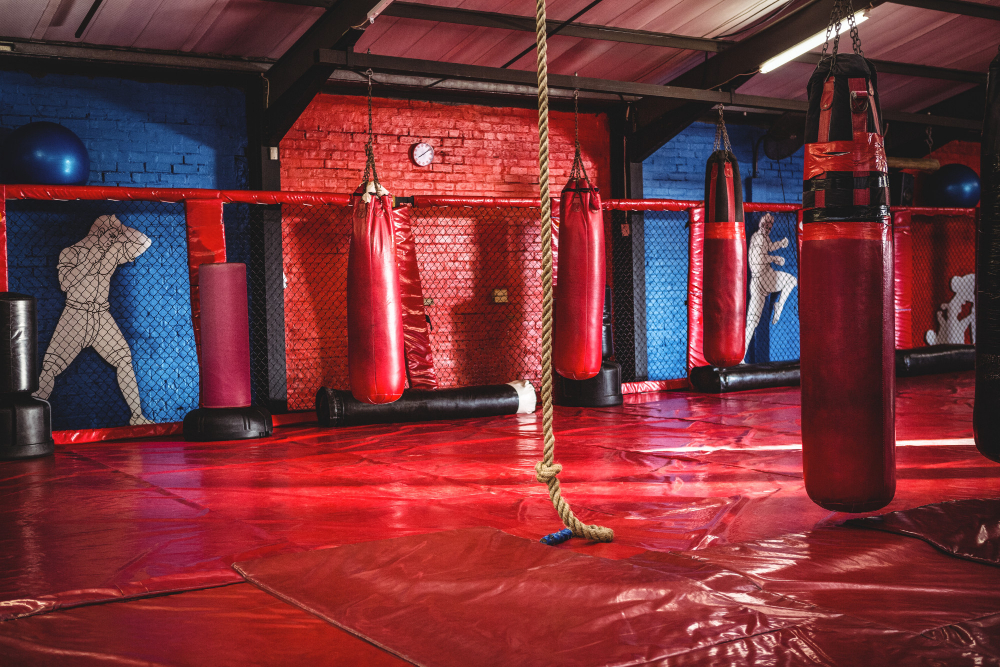Exercise Daily – You’ve made the decision to attend a boxing gym. The direct debit has been set up, and all that remains is for you to step in and begin practicing.
Boxing gyms can be daunting places to visit, but with a little planning and advice, you can get past the first day, week, and year to be a permanent boxing gym member.
Read on to learn what to expect when attending a boxing club, from what to eat before your first workout to how you’ll feel when you finish your first session.
However, the most surprising aspect about boxing is that usually people want to learn boxing but they are afraid to step into a gym. So, such people always have a chance to opt for a home boxing gym.
If you are one of those people who are afraid of going to a boxing club or gym, then home boxing is the best option for you. Now, let’s have a look at each of these two options and let’s make a decision which one would be better for you.
Boxing Gym – Walking in for the First Time

You’ll almost certainly enter a building’s basement and descend some of the stairs. If I visit all of the gyms, I’m willing to bet that at least half of them are like the hardcore, gloomy, dusty, warehouse-style.
Exposed beams make it easy to hang heavy bags and other items in these buildings, which are potentially the easiest to lease or acquire. Anyway, this isn’t true of all clubs, but you’re likely to encounter this kind of environment.
There will be no one to welcome you at the entrance. A boxing ring may be visible, with people punching bags, skipping, and just being cruel and aggressive. Many people turn around and leave at this point; do not do so.
It doesn’t matter what’s going on. Simply find and show yourself to whoever is coaching or training every day. Your first lesson, like at a fitness club, will normally be free so you can check it out. This is critical because not every club or mentor would be a suitable match for you.
Start Early with a Boxing Gym for Kids
Maintaining physical activity in children is more challenging – and critical – than ever, and boxing is one of the most entertaining, fun sports that will spark your child’s passion for fitness. Youth boxing programs have unbeatable workouts while also educating children about patience, perseverance, and hard work.
What Age is Suitable for Kids to Start Boxing?
If a child has an interest in boxing, no age is too young to begin studying the fundamentals of boxing. However, hitting a bag involves a certain level of strength and balance that children do not develop until about the age of seven.
Additionally, it is unlikely that you can find gloves small enough to suit a kid any younger. Shadowboxing is still a choice for younger children who cannot find a pair of gloves small enough.
Physical Fitness Boxing Gym Workout Plan

The majority of boxing lessons last 60 minutes and are divided into three “rounds” that include an intensive aerobic warmup, boxing with bursts of bodyweight workouts, and, of course, core work.
Both three rounds are incredibly difficult and can leave you drenched from head to toe in sweat. A boxing class, for example, will burn between 500 and 1,000 calories per hour.
A boxing round is usually performed with a heavy bag or by shadowboxing, but every gym is different, and some are organized differently.
Now, let’s have a look at some of the boxing gym workouts:
As an Amazon Associate, Exercise Daily earns from qualifying purchases. This post may contain affiliate links. Last updated: January 31, 2026
#1. Running
About 99 percent of boxers run on a regular basis. Running is, in practice, a common component of a boxing exercise for a variety of reasons.
Surprisingly, the first has little to do with the physical side of it. Fighting is as much mental as it is physical, if not more, as most boxers can admit. Running aids in the development of mental endurance.
#2. Strength Training
Strength and conditioning the muscles is a must. Physical training is integrated into the workout of all beginner classes.
A fighter’s body must be capable of not only delivering but also receiving a beating. Strength training is often associated with lifting huge weights and transforming into a massive bodybuilder. However, it is not the reality!
#3. Heavy Bag
The greatest temptation in life isn’t food, wealth, or publicity. It’s like trying not to crash with a heavy bag!
Punching a hard bag with your golden gloves is arguably the most enjoyable way to smash something without getting in trouble, and just because it’s enjoyable doesn’t mean it’s not a valuable source of fitness equipment.
#4. Jump Rope
A common boxing workout is the jump rope. You should continue to use the jump rope frequently during your boxing workout. This basic piece of fitness equipment shows fighters how to maintain their pivot in combat and how to be flexible in their footwork.
#5. Shadowboxing
Shadowboxing would facilitate the development of the required reflexes. It will also improve your balance and allow you to throw punch combinations that will not throw you off control when you miss but will still be powerful enough to knock the other guy out. Shadowboxing may be difficult, but due to great trainers at gyms, it’s not impossible!
Home Boxing Gym – How to Setup?

Although you can get a full-body workout and a built-in group by punching, jabbing, and uppercutting your way into a high intensity boxing class at your local boxing studio.
However, going to the gym isn’t always a choice. Bringing the studio into your home so is an alternative to opt for. So, let’s have a look at how you can set up a gym at your home easily:
#1. Find a Space
The first thing you have to ask is, “Where can I put my home gym?” Is it possible for you to free up any space in your garage? If you have a spare room or a bedroom that isn’t being used? Or maybe you’d like to set up a gym in your own backyard?
The amount of space used is determined by your height and arm length. Be sure you can easily walk about and hit your punching bag without crashing with something else.
#2. Bring in the Boxing Equipment
Although a punching bag will give you a great workout, if you’re going all out and have the room and resources, you may want to try adding other types of bags. Following are some other equipment you will need for your home gym:
Double-end bag: when you strike this rubber ball, it bounces back and forth between the floor and the ceiling.
Hook and upper-cut bags: these bags, which are shaped like an upside-down L, allow you to practice hooks and uppercuts in a unique way than with a free-standing punching bag.
Speed bag: this little bag hangs from a mount which allows you to practice throwing punches as easily and accurately as possible.
#3. Installing a Punching Bag
If you live in an apartment, the safest thing would be to have a standing bag so you don’t have to cut any holes in the roof to install it, which probably won’t be required if you rent.
Freestanding bags, though, are also a decent choice since they are easy to mount, especially though you are building your home boxing gym in a building where you can make any of the holes you want.
Remember that they are less sturdy than hanging bags fixed on a wall or ceiling that require a bracket and chains. However, you can consider the following punching bags for your home gym:
- Century BOB Punching Bag
- Everlast Dual Station Heavy Bag
- RDX Punching Bag Kit
#4. Add Boxing Gear
Aside from the massive equipment used for practicing boxing at home, there are a few additional items that are required, such as hand protection when punching.
You will need boxing gloves or bag gloves because you will most likely be boxing alone, and we suggest a pair of 160 oz gloves for better defense.
They’ll even help you condition your arms and shoulders better than a pair of soft gloves. Hand wraps will also be used to prevent being hurt or experiencing discomfort.
Even the personal trainers suggest you have additional boxing gear like hand wraps during your personal training sessions.
#5. Add Some Weights
Finally, you should add some weights to complete your home boxing gym, particularly if you want to integrate strength training into your routine.
You should buy some kettlebells, dumbbells, and barbells, as well as benches or squat racks if you like and can afford them (you’ll need a lot of room and a bigger budget).
As a boxer, you’ll want to increase your muscle mass in order to improve your strength, endurance, stamina, and power, as well as improve your balance and coordination.
While you do not need to lift weights to accomplish any of the above, lightweight exercise is recommended that you want to stop developing big muscles if you want to be a fast boxer.
Now Your Home Gym Boxing is Ready!
It’s time to start throwing punches now that you’ve set up your home boxing gym! But don’t just start swinging at the bag in a wildly devastating manner.
It’s critical to start by learning basics to practice proper shape and technique, as well as working on developing foundational punch combos.
FightCamp, for example, has a starter course called Prospect Path for boxing newbies that teaches correct training and brings you from the fundamentals of boxing to extreme punch combos. You’ll begin with four rounds and work your way up to eight.
Boxing Gym – FAQs
Can You Learn Boxing on Your Own?
It is impossible to learn to box on your own. For the very least, to do it correctly. The most amazing thing you’ll get is a slew of bad habits that will be far more difficult to break in the future.
You can teach yourself how to hit a bag with force, but you can’t teach yourself how to hit the bag properly.
What is Muay Thai Boxing?
“The art of eight limbs” is how Muay Thai is referred to. The fists, elbows, knees, and shins are among the eight contact points used in this sport.
Muay Thai is classified as a martial art since it is a fighting sport. Classic Muay Thai, on the other hand, resembles kickboxing rather than martial sports like taekwondo or jiu-jitsu.
How is Kickboxing Different from Boxing?
After World War II and the Korean War, kickboxing arose as a means for Western fighters who had been trained in East Asian martial arts such as karate and Taekwondo to put their abilities to the test in the ring.
Is Boxing Good for Self-Defense?
Boxing is, without a doubt, an excellent self-defense sport. This is due to its wide range of defensive and offensive moves, as well as its powerful footwork and range control. When competing against a seasoned boxer, an untrained individual has no chance.
How Long Does it Take to Learn Boxing?
On average, a typical person can become familiar with the basics in 2 months or less, based on how well the person trains and how often he or she attempts to grasp the fundamentals. It does, however, take a year to fully incorporate and master.
Final Verdict
People take up boxing for a number of reasons, including improving their physical health, pursuing a career in sport, or learning self-defense.
And, whatever the reason for picking up a pair of gloves, there are certain advantages to boxing lessons that anyone will appreciate, from serious gym-goers to recreational exercise enthusiasts.
If you’re debating whether or not to start boxing, or whether you’re already a fighter and want to learn more about how it affects your body and mind, then we would suggest you learn it because it has much more benefits than you think.
You can either join a gym club or make one for yourself at your home. If you start your own home boxing gym, then it recommended learning from a personal trainer to get the best training.











